A new law in Texas requires convicted drunk drivers to pay child support if they kill a child’s parent or guardian, according to House Bill 393.
The law, which went into effect Friday, says those convicted of intoxication manslaughter must pay restitution. The offender will be expected to make those payments until the child is 18 or until the child graduates from high school, “whichever is later,” the legislation says.
Intoxication manslaughter is defined by state law as a person operating “a motor vehicle in a public place, operates an aircraft, a watercraft, or an amusement ride, or assembles a mobile amusement ride; and is intoxicated and by reason of that intoxication causes the death of another by accident or mistake.”



It might be a terrible law if it pushes the burden of paying for a child’s care onto a person going to prison for a while, coming out in debt and without transportation, while being expected to pay for child support while also paying for their time in prison and having to find work as a felon instead of social security and welfare helping.
Aside from that it also makes no sense. Different punishments for killing different people shouldn’t be a thing. This will 100% be a law that makes sure criminals and felons stay felons and continue to go in for profit prisons while the government ducks out of paying welfare and social security. What a farce.
I don’t really care in this case, I mean if you chose to risk other people’s lives by drunk driving then who cares if it’s difficult to afford. I honestly think drunk driving is way too tolerated. Also it could also be tied to income, so you pay more if you have a higher income.
The only issue I can see with this, is if you have killed someone while drunk driving isn’t there going to be a good chance the kid will already have reached adulthood by the time the drunk driver is released? That and this does just seem like a way for the state to avoid financially supporting those families. So for those two reasons the law is flawed I would say
It’s not a punishment in this case, it’s a form of restitution to help provide financial security to families that have lost a caretaker/breadwinner.
If you are having to pay out money to no benefit of your own you can try to spin it any way you want. It’s still a punishment.
Restitution is a financial punishment that follows the offender for years and often decades after the fact. Many times offenders on parole or probation are required to remain on probation until restitution is fully repaid, and while on probation/parole it’s extremely easy to have your probation/parole revoked (meaning you get sent straight back to prison, often on fresh charges), plus the requirements for the probation & parole can absolutely violate their rights because “it’s a privilege to be on probation/parole instead of prison”
This is all not mention the difficulty they have getting work after they leave the prison/jail with a felony conviction. There’s a reason so many ex-cons operate businesses, it’s because it’s often the most viable path to a living income